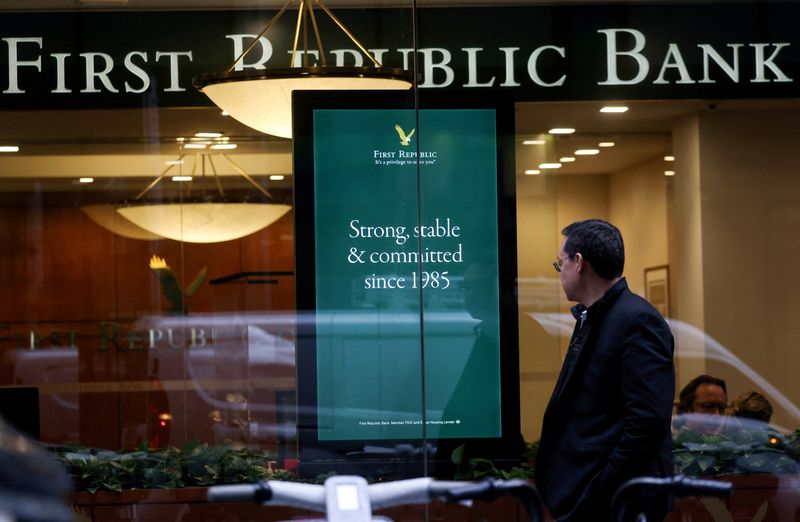By Douglas Gillison and Chris Prentice
(Reuters) -The Federal Deposit Insurance Corporation (FDIC) is investigating potential misconduct by executives and board members of First Republic Bank (OTC:FRCB), raising the prospect of stiff penalties for the failed bank's former bosses.
"We can confirm a D&O probe into First Republic is taking place," a spokesperson told Reuters on Wednesday, referring to the bank's directors and officers. The regulator did not provide further details.
The investigation, which has not previously been reported, is the third the FDIC has opened into bank failures earlier this year which cost the federal government's deposit insurance fund about $32 billion.
FDIC Chairman Martin Gruenberg said in March the agency was also probing possible misconduct related to the collapses of Silicon Valley Bank (SVB) and Signature Bank (OTC:SBNY) New York. The FDIC has not provided updates on these investigations.
The three banks, which combined held more than half a trillion dollars in assets, failed following depositor runs. Regulators have said they each exhibited weak risk management and ran high levels of uninsured deposits.
As with SVB and Signature Bank, the FDIC is probing whether First Republic executives and board members broke rules that require them to act in the bank's best interests.
Under federal law, the FDIC can ban former directors and officers from the industry, and impose fines for breaching their fiduciary duty and unsafe or unsound practices that involve dishonesty or "willful or continuing disregard" for a bank's well being.
Former First Republic CEO and President Michael Roffler and former Executive Chairman James Herbert could not immediately be reached for comment. Attorneys representing the bank's independent board members did not immediately return requests for comment.
Roffler told lawmakers in May that regulators never expressed any concern about the bank's strategy, liquidity or management and it had been "contaminated overnight" by the depositor panic from SVB and Signature Bank.
While it is standard practice for the FDIC to probe bank failures, and not necessarily an indication of wrongdoing, the probe adds to regulatory scrutiny of the failed banks' leadership.
The U.S. Justice Department and Securities and Exchange Commission (SEC) are scrutinizing stock trades and statements made by First Republic ahead of the bank's demise, according to a source with knowledge of the probe. Bloomberg previously reported the investigation.
Massachusetts regulators are also investigating First Republic insiders' stock sales, Reuters previously reported. Federal investigators are likewise probing the collapse of SVB, Reuters and others have reported.
In congressional testimony, former SVB and Signature executives have denied wrongdoing or mismanagement of their banks.
NO ACTION
The March implosions of SVB and Signature Bank sparked a deposit run at First Republic. Despite efforts to stabilize the ailing lender, it failed in May and was sold to JPMorgan Chase & Co. (NYSE:JPM) It was the biggest bank failure since the 2007-2009 global financial crisis. A JPMorgan spokesperson declined to comment.
First Republic was especially vulnerable because it relied excessively on uninsured deposits, grew rapidly with loans and funding concentrated in ways that increased risk, and failed to plan adequately for the possibility the Federal Reserve could raise interest rates sharply, the FDIC has said.
In a September postmortem, the FDIC also highlighted decisions by First Republic's board of directors in the second half of 2022 when they were confronted with serious warning signs.
On at least two occasions, the board collectively decided "to take no further action" after learning one of its risk models was flashing red, causing FDIC supervisors to worry about the bank's "lack of urgency" in confronting the problem.
One model forecast that a 200 basis-point increase in interest rates could more than wipe out the bank's equity.
As the Fed raised rates in 2022, First Republic suffered mounting unrealized losses in its loan portfolio that ultimately exceeded its equity levels, which undermined public confidence, contributing to the fatal run on the bank, the FDIC said.
PENALTIES
In the past, the FDIC has required board members of failed banks to help replenish the deposit insurance fund by ordering them to pay restitution personally or using payouts on their liability insurance coverage, said Michael Krimminger who was the FDIC's general counsel from 2011-2012.
The FDIC has recovered more than $4.4 billion from the directors and officers of more than 500 failed lenders in this way since 2008, according to its website.
"The most severe penalty is to bar an individual from working for a bank in the future," said Krimminger, noting this was reserved for "the more egregious cases."
FDIC bank failure probes can take years.
Four years after IndyMac collapsed in 2008, the FDIC banned its former CEO Michael Perry from the industry, accusing him of negligence.
In a settlement, the FDIC, which suffered a nearly $13 billion loss from IndyMac's collapse, collected $11 million in an insurance payout and $1 million in Perry's personal assets. Perry's lawyers said he "steadfastly denied" the allegations.
